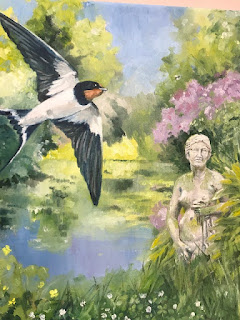Perhaps there are too many bird poems already and
perhaps all the things that might be said about them have been said, and
certainly better said, than anything I can do now – perhaps, in short, birds in general have
become too poeticised, perhaps, perhaps...
And yet the arrival – that long awaited, much looked
forward to – was that really a swallow? – of the traditional herald (no,
not that poeticised word 'harbinger'), of summer's-on-its-way, inspires
(another poeticised concept to be avoided!)... well, at least, triggers ideas,
memories, and happy associations.
So here's my simple celebration of the swallow.
It's a great pleasure to head it with my friend's
painting, which alludes to various questions and man-made stories associated
with this lovely bird – details below.
I've tried to incorporate them into my poem, as he has in his picture –
more after the poem, if you're interested.
The
Swallow
Stream-lined swallow with tapering streamers
flying so low and
close to us –
now wheeling,
gliding down to the water
scattering droplets,
soaring once more –
you've brought fresh
spring along with a smile
and warmth that we
can look forward to –
all from a far-away
Africa.
I wonder where, fleet sweet swallow
just where do you belong?
Ours for the summer in your well-used nest
familiar, near and close to us
you'll hatch your chicks, feed the fledglings
– only to do it all again.
But soon enough the time will come
to leave your celandines, our banks of mud
old Ovid to his curious stories –
daughters of the kings of Athens! –
and follow, my dear swallows, valleys
friendly rivers, wandering coast lines
to your welcoming southern home
where winter is no more. Until
you will return, forsaking them
who claimed you as their own as well,
weathered and ready once again –
as certain as this old world turns
and man will tell his tales –
to wheel and glide, bring clear-eyed innocence
to this no longer far-away home.
So, many thoughts from those who've come and gone, in
their own ways responding to this beautiful bird.
The association of the swallow with the celandine, for
example, is interesting. You can research all this and more as well as I, but
for now I'll just say that chelidon translates as both celandine and swallow,
that Ovid tells the story of Philomela (daughter of the king of Athens) turned
into a swallow and that spring, good fortune and love are celebrated through the swallow in,
for example, the Latin poem Pervigilium Veneris (Quando fiam uti chelidon –
when shall I be like the swallow?) – which makes an appearance at the end of
The Waste Land.
But happily I'll now leave all this, along with Gilbert
White's description of swallows spending the winter in mud banks, the myths
linking swallows and celandines to eyesight problems and links to various other
old birds like Tennyson – and simply hope that you too may feel a surge of
recognition and anticipation this early May as you watch your – yes, your, at
least for this spring and summer – swallows.
Painting by John Secgan
Original Oil Paintings -
John Secgan Art
secgan.com

Never too many bird poems when they’re as graceful and evocative as this
ReplyDelete